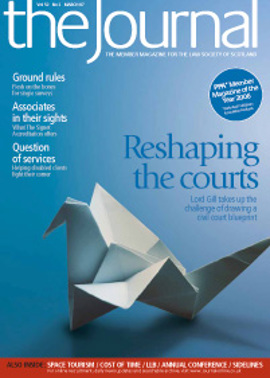In the family way

The most noticeable feature of the recent claims experience is that almost all claims arising out of family law work fall into one of four categories, illustrated by the following case studies.
Failure to advise
Solicitors were acting for Mrs A in connection with the preparation of an agreement dealing with the sharing of the parties’ matrimonial property on separation. Mrs A subsequently alleged that her solicitors had failed to advise her in relation to her spouse’s pensions and, in particular, that if she settled on the basis set out in the agreement she would be giving up her rights to make a claim on his pension rights.
In this case study, one could have substituted fair sharing, valuation of assets, earmarking, periodical allowance and so forth – claims have arisen from an alleged failure to advise on almost every aspect of financial provision on separation and divorce. Some of these claims may arise from a lack of knowledge of up-to-date developments in family law. More often there is simply an omission by the solicitor to make sure that comprehensive advice is given in writing on all significant aspects of the case. In the claims that have arisen, even where the solicitor is adamant that the advice was given during a telephone call or at a meeting, there has tended to be no file note of the telephone call or meeting and no follow-up letter to record that advice was given and what that advice was.
Some clients can present particular challenges, for example those clients who wish to achieve a speedy settlement, which is not in their best interests and often against their solicitors’ advice. Having settled in haste, some of these clients may repent at leisure and later seek to blame their solicitors, often on the basis of an allegation that they would not have agreed settlement if only they had received advice on a particular matter.
However difficult it may be, it is necessary that the client, however unwilling to take, or even listen to, your advice, should have full information in writing on which to give instructions. If necessary, have the client sign a duplicate of the letter particularly when he or she wishes to proceed against your advice.
More generally, risk management measures which may help minimise claims relating to an allegation of failure to advise include checklists/questionnaires. These can be a valuable aide-memoire to help ensure not only that all relevant aspects of the case are covered but that advice on these matters has been given in writing. Terms of engagement should also address communication with the client by providing for the mode and frequency of communication.
Delay/failure to implement agreement
As part of a financial settlement on her divorce, the title to the former matrimonial home was to be transferred to Mrs B. Unfortunately her solicitors delayed or overlooked carrying out the necessary conveyancing work and Mr B’s estates were sequestrated before the conveyancing was completed.
These claims inevitably arise following the death or bankruptcy of the spouse who is obliged to implement the terms of a financial settlement or divorce decree by transferring property or making a payment to the other. Sometimes, it proves to be impossible to procure implementation of a decree or agreement.
From a risk management point of view, however, oversights and unjustified delays can be avoided by creating checklists and conducting file reviews or audits, and, where delays or difficulties are foreseen, by good communication in order to manage the client’s expectations on timescale.
Errors/failures in court proceedings
Solicitors acting for Mrs C in her divorce action failed to lodge notice of intention to defend. Decree of divorce was granted with the result that Mrs C lost her entitlement to claim financial provision.It goes without saying that it is necessary for practices to have a diary system with adequate countdown warnings of impending critical dates. However, practices need to go further in order to manage critical dates effectively. An analysis of time bar claims shows that such claims rarely arise as a result of poor diarying systems. Common underlying causes include:
- failure to enter the relevant date in the diary
- miscalculation of the relevant date
- failure to look at the diary
- absence/failure of systems of supervision/file review/file audit which could have detected the above errors
- inadequate systems to deal with absence/illness of fee earner
- no/inadequate systems to deal with file handover procedures when files are transferred from one fee earner to another.
The firm’s systems and procedures for managing critical dates need to address all these issues.
Errors in drafting agreement
It was provided in a separation agreement that an insurance policy was to be transferred to Mrs D. The policy could not be transferred because it had lapsed when Mr D ceased payment of the premium. Mrs D intimated a claim against her solicitors, alleging that there was no clause in the agreement requiring Mr D to continue paying the premium.
Drafting errors and ambiguities are a common feature, not only of family law claims, but of the Master Policy claims experience as a whole. Often, as in the case study, the underlying cause of what may be perceived to be a drafting error is a failure to anticipate a risk and protect the client against it. In this type of case, a checklist of issues focusing on potential risks and worst-case scenarios can be useful.
Russell Lang is a former solicitor in private practice who works in the FinPro (Financial and Professional Risks) National Practice at Marsh, the world’s leading risk and insurance services firm. To contact Russell, email: russell.x.lang@marsh.com.
The information contained in this article provides only a general overview of subjects covered, is not intended to be taken as advice regarding any individual situation and should not be relied upon as such. Insureds should consult their insurance and legal advisers regarding specific coverage issues.
Marsh Ltd is authorised and regulated by the Financial Services Authority.
In this issue
- A look in the mirror
- A welcome review
- Squaring the circle
- Profitability and financial structure
- Access-ability
- Culture change
- Practice? What practice?
- Signet badge takes wing
- Four in one
- Appreciation: Angus McLean
- In on the Acts
- "Lossiemouth, we have a problem"?
- Flagging up VAT
- In the family way
- Practice inside out
- Shape of things to come
- Breaking down a brick wall?
- Playing by the rules
- Scottish Solicitors' Discipline Tribunal
- Website reviews
- Book reviews
- Funny thing
- PIPs' hour approaches
- Enabled in the housing market
- Registers refresher






